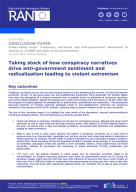Details
- Publication date
- 5 August 2022
- Author
- Directorate-General for Migration and Home Affairs
- RAN Publications Topic
- Counter- and alternative narratives
- Violent right-wing extremism
Description
Conspiracy narratives are not new but have recently become a more pressing policy concern, as they have become prominent “drivers” of anti-government and anti-establishment sentiments. More specifically, EU Member States have seen the emergence of a protest movement that is partially driven by adherents of conspiracy narratives around the COVID-pandemic.
Against this background, a RAN cross-cutting event took place on 26 April 2022 with the purpose of bringing together the perspectives of policymakers, practitioners and researchers. The participants discussed elements of (violent) extremist ideologies linked to anti-establishment sentiment and conspiracy narratives in the context of anti-COVID protests, exploring ways to prevent violence driven by such narratives.
The aim of this conclusion paper is to highlight the main points of the discussions, relevant recommendations including promising practices, and the following key outcomes as listed below:
- People who believe in conspiracy narratives are not part of a homogenous group. Although anti-government sentiment as well as right-wing and left-wing extremist actors were present at COVID-related protests in the past, we cannot draw a clear line between protesters, anti-government sentiment and radicalisation leading to violent extremism.
- What is clear is that in many cases, persons who believe in conspiracy narratives are in some kind of personal crisis (e.g. financial debt, reputation loss, job loss, partner loss) when they decide to subscribe to stories claiming, for example, that Bill Gates is using the pandemic to put microchips in people’s bodies to control them. Some narratives call for the degrading of others (members of out-groups) or are proclaiming an existential, apocalyptic threat that justifies or even mandates violence, which makes those narratives particularly relevant for prevention and countering of violent extremism (P/CVE) practitioners and policymakers.
- This being said, the political situation in which people turn to conspiracy narratives needs to be acknowledged. As freedom-restricting decisions were taken by governments across the EU during the pandemic, people might have felt that they have little influence on decisions that have a direct impact on their lives, find it difficult to follow or understand what governments are doing and why, have to deal with uncertainty, have lost touch with mainstream political parties, etc. Therefore, this is also an issue of public communication.
Most conspiracy narratives promise a caring community, belonging, safety, agency, adventure and often even heroism. Simply put, people believe in conspiracy narratives to feel better. In order to help them distance themselves from such narratives, policy, research and practice must build on past experience in P/CVE and come up with new strategies to replace whatever personal benefits people gain from believing in them.

